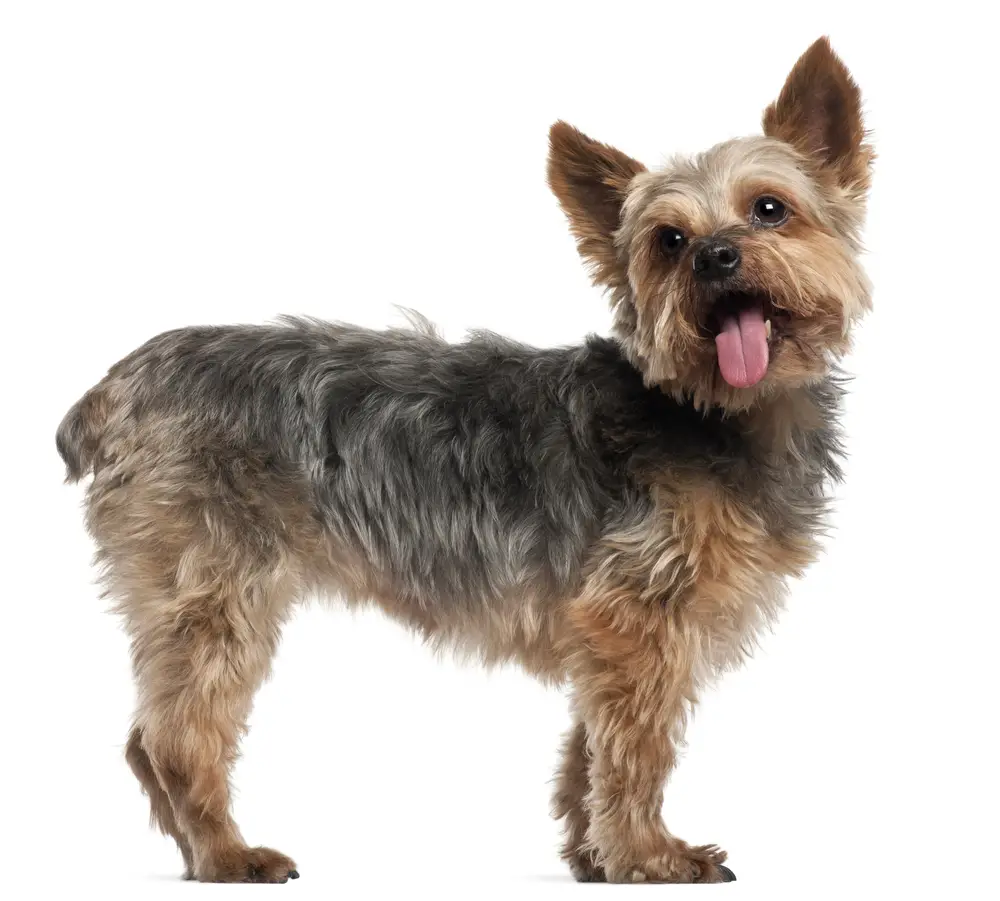Your Guide to Yorkie Dental Care
Your Guide to Yorkie Dental Care
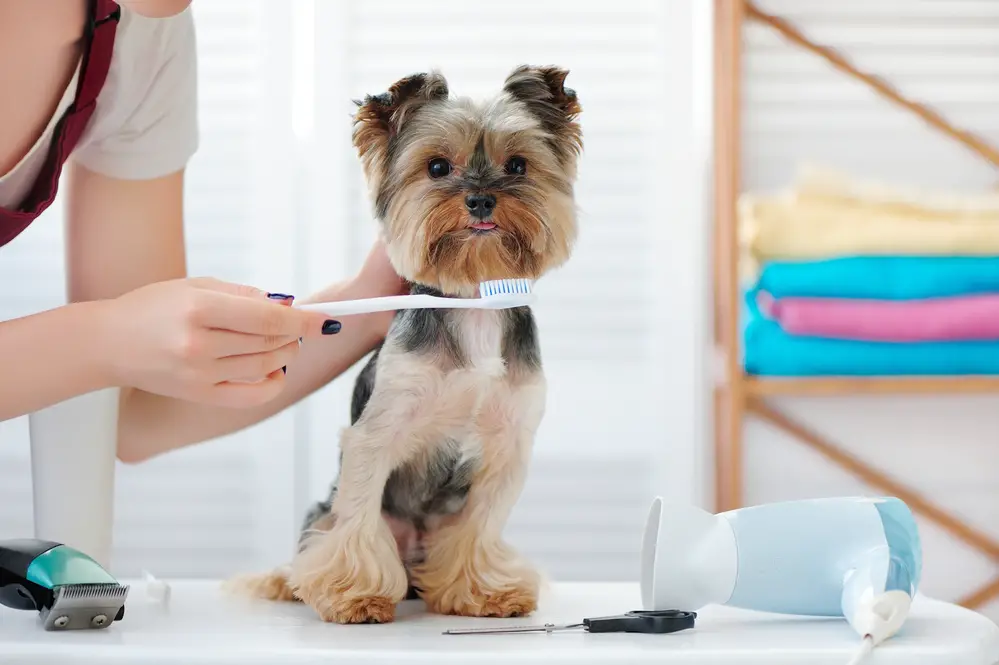 While all dogs can develop dental problems without regular cleaning, Yorkies are especially prone to issues like gum disease, overcrowded teeth, and decay. Owning a Yorkie requires paying special attention to your pup’s unique health needs, especially when it comes to caring for their teeth. Here’s what you should know about Yorkie teeth and how to keep your Yorkshire Terrier happy and healthy for many years to come.
While all dogs can develop dental problems without regular cleaning, Yorkies are especially prone to issues like gum disease, overcrowded teeth, and decay. Owning a Yorkie requires paying special attention to your pup’s unique health needs, especially when it comes to caring for their teeth. Here’s what you should know about Yorkie teeth and how to keep your Yorkshire Terrier happy and healthy for many years to come.
Why Is Yorkie Dental Care So Important?
Dental disease is one of the most common chronic health problems in cats and dogs. About 80% of all dogs have some form of dental disease by the age of two. Unfortunately, Yorkshire Terriers are even more likely to develop teeth issues than other dogs.
Dental disease in your Yorkie begins with tartar buildup on the teeth. Dogs’ mouths are more alkaline than humans which helps promote plaque formation.
This tartar later progresses to plaque, gum disease and infection at the roots of the teeth. Without care, it can lead to premature tooth loss, difficulty eating, and pain. Yorkie teeth issues that are neglected can even affect your dog’s overall health. There’s a clear link between gum disease and canine heart disease like congestive heart failure and inflamed heart valves.
Common Yorkie Dental Problems
Unfortunately, Yorkies are very prone to a number of dental concerns. This is due to genetics as well as their small size which can make their mouth very crowded. Here are the biggest concerns you should watch out for.
Double Teeth Syndrome
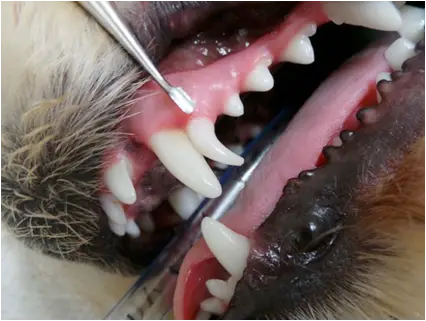
Double Teeth Syndrome – Yorkies United
Like people, Yorkies have two sets of teeth in their life. Wondering how many teeth do Yorkies have? More than you! Your Yorkie should have 28 primary or baby teeth then 42 permanent teeth.
The key word here is should. Yorkies are prone to something known as double teeth syndrome. This means your dog may have two of the same type of tooth at the same time. You will probably notice this when your Yorkie is teething, or around the age of 3 to 5 months. It will look like a second row of teeth behind the existing primary teeth.
With some Yorkies, the primary teeth don’t fall out like they should. Instead, your Yorkie may end up with two sets of teeth — or just several “extra” teeth. The retained baby teeth will probably fall out on their own later or you can have them removed. Many vets recommend removing them when your puppy is spayed or neutered to prevent serious Yorkie dental problems.
If you don’t have the second teeth removed, you’ll need to be very diligent about brushing and cleaning your Yorkie’s teeth. The extra teeth make it easy for plaque to build up and contribute to dental decay, gum disease, and early tooth loss. The retained primary teeth are not as mineralized as the adult teeth, either; they are at a greater risk of fracturing even during regular chewing which can cause infection and pain. These Yorkie teeth problems can even cause more serious complications like poor jaw development.
Gum Disease
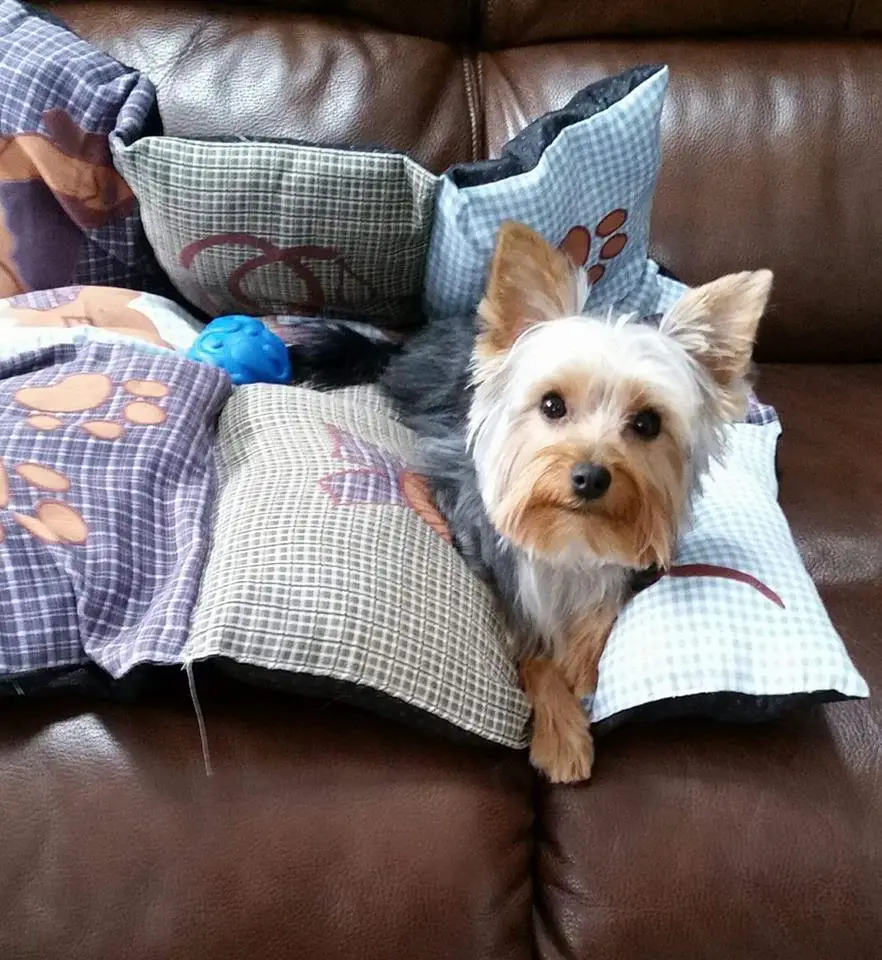
Bella – Courtesy of Josie Marsters
Severe gum disease is something you don’t want to see happen to your Yorkie. At first, gum disease has no symptoms but it can easily progress to tooth loss and pain. With advanced periodontal disease, you may notice troubling symptoms like:
- Extremely bad breath
- Blood on chew toys
- Bleeding gums
- Difficulty picking up kibble
- Chewing on one side of his mouth
- Nasal discharge or sneezing. This happens as the gum disease destroys bone in the oral and nasal cavity.
While most dogs — and people — develop some degree of gum disease eventually, it’s something you want to avoid as long as possible.
Premature Tooth Loss
Gum disease, dental crowding, and plaque buildup can all contribute to a serious complication: your Yorkshire Terrier’s teeth falling out. Yorkie tooth decay and gum disease can cause your Yorkie to lose all or most of their teeth by the time they’re a few years old. As your dog loses teeth, they will have trouble eating and playing. They may also experience pain and gastrointestinal issues.
How to Care for Yorkshire Teeth
Now that you know how important it is to care for Yorkie teeth, it’s a good idea to know how to do it. It isn’t enough to take your Yorkie to the vet for an annual cleaning; just like your teeth, Yorkie teeth require regular cleaning outside their regular checkups.
If you aren’t very excited about the thought of brushing your Yorkshire’s teeth every day because you know they aren’t going to like it, there’s good news: there are techniques to make cleaning easier and faster. Your Yorkie will also adjust to the process, especially if you begin when they’re young.
Here’s how to clean your pup’s teeth to avoid these frightening Yorkie teeth problems you now know can happen.
Use the Right Tools

Daisy – Courtesy of Audrey Creighton
There are a few tools you can use to clean Yorkie teeth. A child’s toothbrush or finger toothbrush will work or you can use a specially designed dog toothbrush. A toothbrush meant for a dog usually has a very long handle with dual-ended bristles: one for the back teeth and one for smaller teeth in the front. This set of Ortz dog toothbrushes is a good choice because it includes a long-handled toothbrush and a finger toothbrush so you can see which your Yorkie prefers.
Along with the right toothbrush, you’ll want to use dog toothpaste. Never use human toothpaste or baking soda which can harm your dog if swallowed. Most pet toothpastes are flavored with pork, beef, chicken, or malt to make your Yorkie more tolerant to the brushing process.
Pet toothpastes like Virbac C.E.T. Enzymatic Toothpaste also use enzyme formulas to inhibit plaque and bacteria instead of fluoride which isn’t safe if swallowed. After all, your Yorkie isn’t going to spit and rinse after you brush!
The Perfect Technique for Brushing Yorkshire Teeth
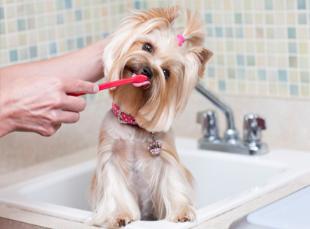 As important as it is to brush your Yorkie’s teeth, you don’t want to make them hate you or fear the sight of the toothbrush. To help them get comfortable with the process, give your Yorkie a tiny sample of the toothpaste first to get them used to the taste.
As important as it is to brush your Yorkie’s teeth, you don’t want to make them hate you or fear the sight of the toothbrush. To help them get comfortable with the process, give your Yorkie a tiny sample of the toothpaste first to get them used to the taste.
With your Yorkie on your lap, lift their lip to expose the outside of the teeth and gums. Use gentle, circular motions to clean the cheek-facing surfaces of the teeth and gums. Make sure you give the canines and back upper molars extra attention as this is where plaque buildup will be most apparent. Don’t worry about brushing the inside surfaces unless your Yorkie is comfortable.
These tips can make Yorkie dental care a bit easier and more comfortable for you and your pup:
- Make sure you speak in a soothing manner while you brush your Yorkie’s teeth.
- When you first begin brushing your Yorkie’s teeth, start with sessions of just a few seconds to help them adjust. Work your way up to a full minute of brushing.
- If you get frustrated or your dog isn’t comfortable, stop right away. It’s okay to quit for the day if your Yorkie gets agitated.
Always give your pup a treat as a reward after every brushing session. - Starting as early as possible with Yorkie dental care can make brushing easier later. It’s easier to get a puppy accustomed to having their teeth brushed than it is with an adult.
- Give your Yorkie plenty of chew toys and synthetic bones like Dentastix or Greenies to help strengthen their gums and teeth and naturally remove plaque between brushings.
- A special dental care diet like Royal Canin Dental formula may be a good idea for Yorkies prone to dental problems. A dental formula includes ingredients that help inhibit bacteria while scraping plaque off your dog’s teeth.
- Make sure your Yorkie gets regular dental checkups every 6 to 12 months.

